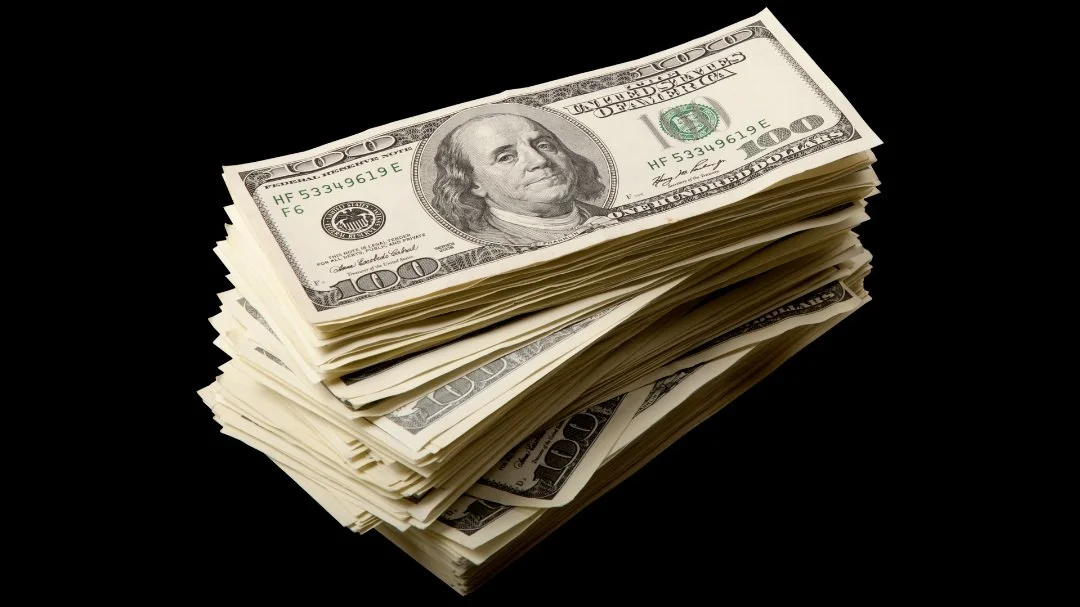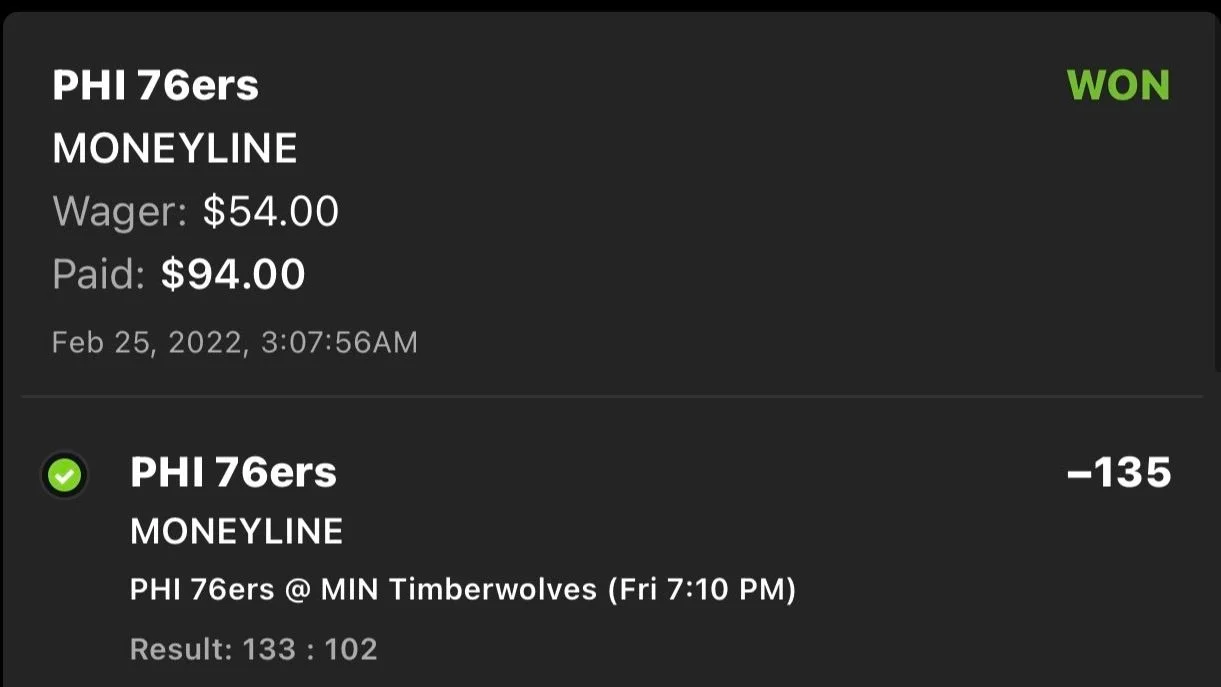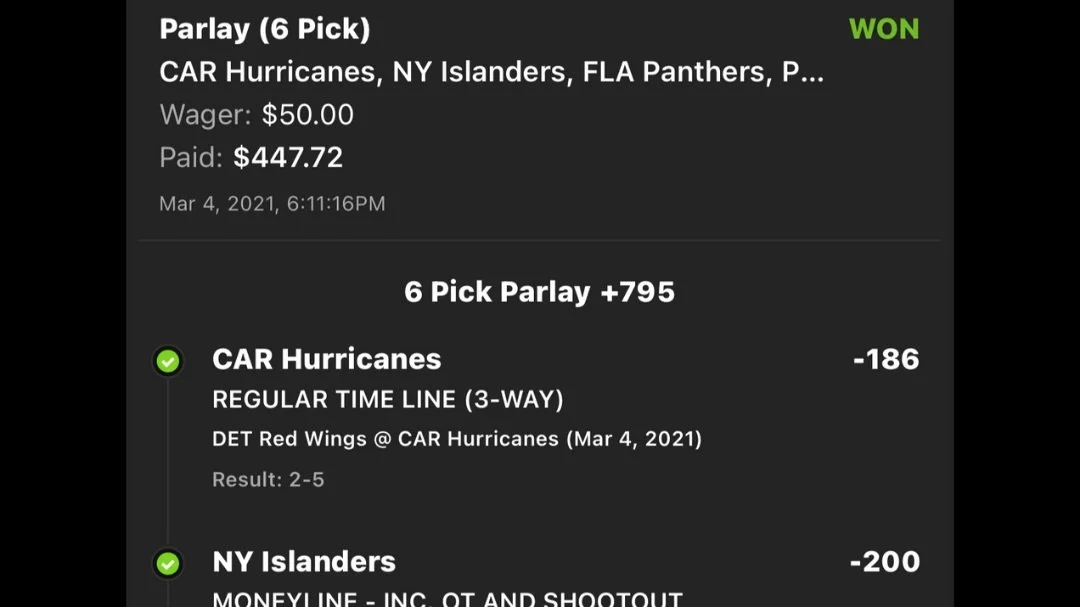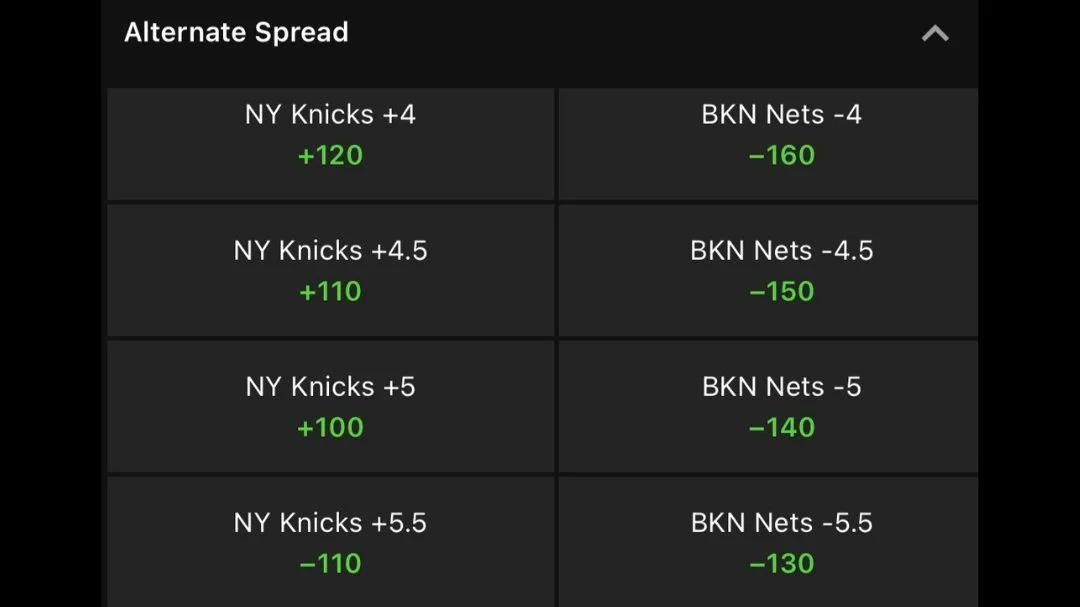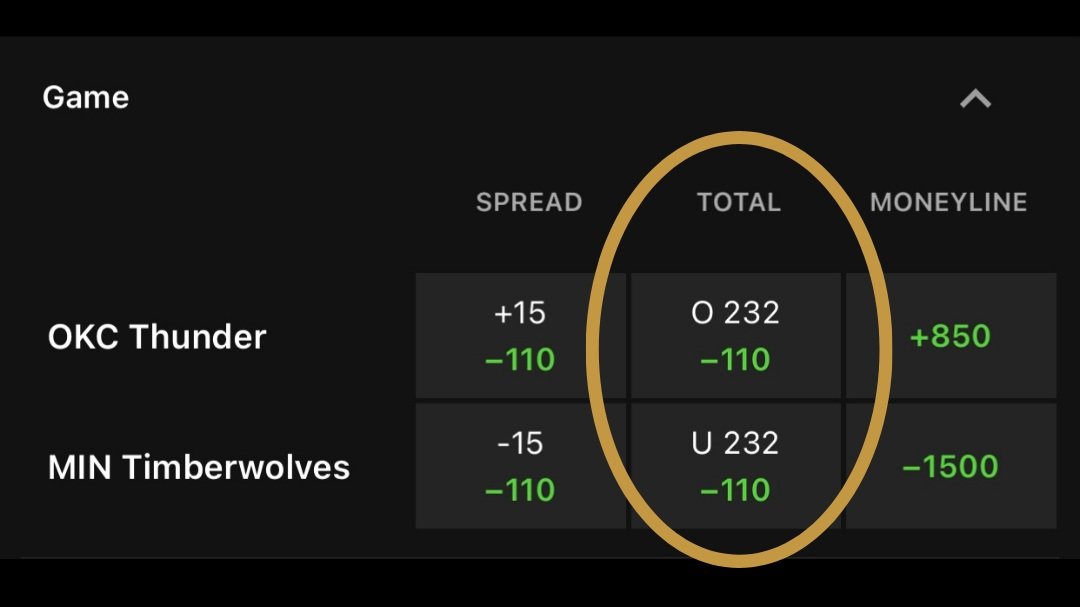EDUCATION
BASICS
SPORTSBOOKS
A sportsbook is an establishment or online service that accepts bets on sports events.
With sports gambling becoming legal in more and more states, sports investing is becoming more accessible.
There are many different ones to chose from and they all offer something different. Especially with signup bonuses.
To help you chose the best legal online book(s) for you, visit covers.com. This was one of the best resources I found that list the top 10 online books by state.
BANKROLL
Your bankroll is the available funds you have to bet with.
This is set aside money that you can AFFORD to lose. Do not bet money that will effect your life in a negative way if it is lost.
Everyone has a different bankroll amount. DO NOT feel you need to be a thousand dollar bettor like I am. 10 years ago, I started as a $25 per unit bettor.
I recommend starting with a minimum of $3,000.
UNITS
A unit is the amount of money that you are wagering on a game. Based off of your bankroll starting amount, a unit will be a set percentage of your bankroll. I recommend 1-5% of your bankroll to be wagered per straight bet. The higher the percentage, the higher the confidence is in the wager.
Example: Bankroll is $3,000
1 unit: $30
2 unit: $60
3 unit: $90
4 unit: $120
5 unit: $150
It is up to you if you want to pay the juice to win the desired units or risk the unit amount to win less than the desired units. I recommend paying the juice, unless I state otherwise in the VIP portal.
Example: Bankroll is $3,000
Bet: Minnesota Wild ML -110
To Win: 3 units
Risk: $99
To win: $90
STRAIGHTS
A straight bet is a single wager.
Straights are the bread and butter of my system and are the best way to be a profitable sports investor.
Straights come in the form of:
Moneyline (ML)
Spread (-/+)
Total (o/u)
Team Total
Props
PARLAYS
A parlay is when you take multiple bets (at least two) and tie them together. This means that all of the selected bets need to win in order to win the parlay.
I love parlays and they are a part of my daily capping. They are a great way to wager little for a big return.
You can expect 1-5 parlays from me daily that risk less than a unit each to win multiple units.
TEASERS
A teaser is a special betting type where you can adjust the points spread and/or the total for a game.
The more you change the spread/total, the more the odds change on the bet.
You will see me play these a lot during the NFL season. Occasionally, I will have a basketball teaser.
LINES / ODDS
The line or odds on a game are the tax that sportsbooks create for placing a wager. Typically, books offer -110, which means that you need to win 52.38% of your bets to break even. Those odds do change depending on the situation, but -110 is the standard.
Example:
You can see in the photo how the odds change based on what spread number you want for either team.
Terms to know:
Even Money – A bet where you are not paying any tax and the odds are +100.
Ex. Bet $100 to win $100
Live Odds – Live lines that update immediately as sportsbooks adjust their lines during games as they are being played.
Run Line / Puck Line – For baseball or hockey, this is your spread. Almost always you will see -1.5 for the favorite and +1.5 for the underdog. This means that a favorite has to win by at least two runs (or goals) for you to win your bet, while an underdog could either lose by one run or win straight-up to win the bet.
Reverse-Line Movement – Betting line movement that contradicts the public betting percentages. For example: if Team A is receiving 80% of the public bets as a 7-point favorite yet the line drops to -6.5, this is an example of reverse line movement.
Buying Points – Also known as alternate lines. Buying points is the act of adding a half point or more to a number being given by the sportsbooks. This will effect the odds of the bet.
BET TYPES
MONEYLINE (ML)
A moneyline (ML) is a where you are picking the straight up winner of the game being wagered on.
If you bet on the underdog, most times you will be receiving “plus money.” This means that you can risky little for more in return.
Example
If you were to bet on the Thunder (as pictured), the ML is +850.
$100 bet wins $850
The Thunder are a big underdog in this game, so the books will give you a big return if they win outright.
This will sometimes entice bettors to “take a shot,” which can help books off set the action they have on both teams.
SPREAD
A spread is the amount of points being given to the favorite and underdog of the game.
Favorite – The team bookmakers expect will win the game.
Dog – Short for underdog, this is the team which bookmakers assume will lose the game.
Example:
Favorite: Timberwolves -15
Underdog: Thunder +15
+/- 15 is the spread
At times, games will be a Pick’Em which means that neither team is favored. This means the spread is 0.
TOTAL (o/u)
Also known as the over/under.
The total is the amount of points/goals/runs that will be scored in the game.
If both teams combine to score more than the total, the over wins.
If both teams combine to score fewer, the under wins.
TEAM TOTAL (TT)
A team total is where you are betting on a specific team to score over or under the line given for that specific game.
Example:
OKC’s TT line is 108.5
To win the under, the Thunder would need to score 108 PTS in the game or less.
To win the over, the Thunder would need to score 109 PTS in the game or more.
PROP
A prop bet is where you are betting on something other than the outcome of the game.
Common prop bets include an over/under on an individual player stat line.
Example:
PTS (Points), REB (Rebounds), & AST (Assists) is a common NBA player prop bet.
This means that you are betting on a player to combine for more or less than the number shown (line given).
All 3 stat categories are totaled at the end of the game to see if the over or under has won.
The line given is the total number amount that the sportsbook predicts the player will get for the game.
MONEY MANAGEMENT
TAKING PROFITS
Coming Soon
INCREASING UNITS
Coming Soon
TERMS
Action – A wager of any kind.
Added Game – A game that is not part of the regular Las Vegas rotation. Oftentimes this will be a rescheduled game or the second game of a doubleheader.
Against the Spread (ATS) – Refers to taking or laying points (aka the spread) as opposed to taking a game straight up.
Arbitrage – The simultaneous purchase and sale of the same game in different markets to profit from unequal prices.
Bankroll – The available funds you have to bet with.
Bookmaker – A person who is licensed to create betting lines and take wagers.
Buying Points – Paying an additional fee in order to get a game at a more attractive price. Often times bettors will buy points in football around key numbers such as 3 and 7.
Chalk – The favored team.
Contrarian Betting – Also known as betting against the public, contrarian betting finds value by betting on games with lopsided betting percentages.
Cover – In sports such as football and basketball, a bettor wins their bet if they cover the point spread. For example, if you bet a 7-point favorite and they win by nine, you have covered the spread.
Dime – A bet of $1,000.
Dog – Short for underdog, this is the team which bookmakers assume will lose the game.
Draw – Also known as a push. If a game falls exactly on the spread, there is no winner and bettors will receive their money back.
Edge – A bettor’s advantage against the house. This will typically refer to an instance where you have a positive expected value.
Even Money – A bet where you are not paying any vigorish (i.e. +100).
Favorite – The team bookmakers expect will win their game.
Field – In proposition (prop) bets, bettors are often allowed to bet the field. This refers to an accumulation of all the teams or players that are not specifically listed.
Future – This refers to bets that come down in advance of an event. For example, one can bet a Super Bowl future prior to the beginning of the season by selecting which team(s) they believe will win the championship. A bettor receives payment at the end of the season if their selection did claim the title.
Hedging – Placing bets on the opposite side after you have already placed a wager on one side. This can be used to either cut your losses, or guarantee a profit.
Hook – In spread based sports, the hook is an extra half-point that bettors can get. Oftentimes in football, bettors will buy the hook around key numbers like 3 to get a line of 3.5.
Grand Salami – This typically refers to the over/under total for how many goals/runs will be scored across all games in a specific league.
Juice – This is the tax that sportsbooks create for placing a wager. Typically, books offer -110, which means that you need to win 52.38% of your bets to break even. Some books will offer reduced juice with lines between -104 and -107.
Key Numbers – This represents the most common margins of defeat, and is used frequently in football where many games end with one team winning by a multiple of three or seven.
Limit – The most money a sportsbook will take on a single event.
Lines – Another term for the odds.
Middle – This occurs when you bet on both sides of a game and have an opportunity to win both bets. For example if you bet on Team A +10.5 and Team B -7.5, you win both bets if Team B wins by 8-10 points.
Moneyline – In sports like baseball, soccer and hockey, there are so few runs/goals scored that it doesn’t make sense to only offer a spread. Instead, these sports offer a moneyline in which you bet on whether or not a specific team is going to win straight-up.
Nickel – A bet of $500.
Off the Board – A game or event that sportsbooks will not allow you to bet on. Oftentimes a game is taken off the board if there is uncertainly surrounding a player’s injury status or the weather.
Over/Under – Also known as the total, this refers to the total amounts of points/goals/runs that will be scored in the game. If both teams combine to score more than the total, the over wins. If they combine to score fewer, the under wins.
Parlay – When a bettor makes multiple bets (at least two) and ties them together, you need multiple events to all win for higher payouts. This is a risky proposition, but potentially very lucrative.
Pick ‘Em – An instance in which neither team is favored. In spread based sports like basketball or football, this is a line of 0.
Prop Bet – A bet on something other than the outcome of a game. Common prop bets include an over/under on points scored, passing yards, or strikeouts by an individual player.
Public Betting Percentage – Also referred to as public betting trends, we offer real betting percentages from seven contributing sportsbooks. These numbers represent real bets placed at real sportsbooks. These percentages are integral for our betting against the public philosophy.
Push – When a contest ends without a winner. In a moneyline sport this happens if the game ended in a tie. In a spread sport, this happens if the favorite wins by the exact spread.
Real Time Odds – Live lines that update immediately as sportsbooks adjust their lines.
Reverse-Line Movement – Betting line movement that contradicts the public betting percentages. For example: if Team A is receiving 80% of the public bets as a 7-point favorite yet the line drops to -6.5, this is an example of reverse line movement. This indicates that sharp money is taking Team B.
Return on Investment (ROI) – A performance measure used to evaluate the efficiency of an investment.
Run Line – In moneyline sports like baseball or hockey, you can take the equivalent of a spread — the run/puck line. This alternative allows you to add runs for the underdog, or subtract them from the favorite. This means that a favorite has to win by at least two runs for you to win your bet, while an underdog could either lose by one run or win straight-up to win the bet. The benefit of this is that you can bet more lucrative lines on favorites, but because baseball and hockey are such low-scoring games, this can be a risky proposition.
Runner – An individual who places a bet on behalf of another person.
Steam Move – A sudden, drastic and uniform line movement across the entire sports betting marketplace.
Teaser – A special bet in which you are able to adjust the point spread or total for a game. The more you change the spread, the lower the payout becomes.
Tout – An individual who sells their picks or their sports betting expertise to others.
Units – We consistently report sports betting wins/losses according to units won or lost. We recommend betting one unit per game, which refers to a standard monetary measurement — typically between 2-4% of your bankroll. For example if your bankroll is $1,000, one unit is between $20 and $40. Then if you noticed a system that has won 15 units over the season, you could easily calculate your earnings by taking the units earned and multiplying them by your standard betting unit (in this case, $20 x 15 units = $300).
Wager – Any type of bet.
All definitions are from Action Network.



